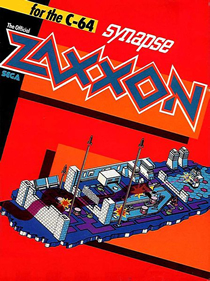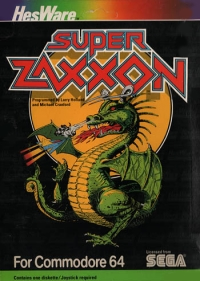Beyond arcades, Zaxxon was part of a larger controversy involving licensing for home computers. Shortly after the game was released in arcades, a member of Sega Enterprises’ legal department, Robert Crane, who was hired to do non-legal marketing, suggested that Sega should license its video game properties for the Commodore C-64 computer. It was already licensed to Datasoft for home consoles and computers, including the Atari family of machines, the Intellivision, and the ColecoVision. Commodore, which represented a sizable chunk of the home computer video game market, had still not received Sega titles. When Sega declined Crane’s suggestion, he tried again, convincing the company to license Zaxxon to a firm called Universal Licensing. Universal would manufacture and distribute the game on floppy discs for the Commodore machine. Sega would receive a minimum compensation of $10,000, with a $5,000 down payment as a further guarantee against six percent royalties.
 What Crane failed to disclose to Sega was that he was also the owner of Universal. Crane was literally the entire company; it consisted of him alone. Crane investigated and found that the Zaxxon license was worth considerably more than what he offered. He then modified Sega’s standard license to give Universal the authority to sublicense. Under a pseudonym, Crane subcontracted Zaxxon to a company called Synapse Software. A lawyer friend of Crane’s named Brian DePew was paid $1,000 to pose as Universal’s general counsel when they met with Synapse, and Crane wanted to secure a sublicense for Synapse that included a $50,000 advance to Universal against 16 percent royalties. Crane claimed to Sega that he had “saved the deal” because Universal could not manufacture the game. Not knowing of the Crane’s subterfuge, Sega signed the sublicense in October of 1983, but the sublicense that DePew signed omitted the financial terms of the agreement. Crane subsequently added them back into the contract with Synapse, which was signed in November. Essentially, Sega was paid the $5000 advance, but only after Crane (representing Universal) received the $50,000 advance from Synapse, signing the cover letter under his pseudonym and backdating it to September 30, when payment was originally due. Crane then took the check personally to Sega’s accounting office in his role as legal counsel.
What Crane failed to disclose to Sega was that he was also the owner of Universal. Crane was literally the entire company; it consisted of him alone. Crane investigated and found that the Zaxxon license was worth considerably more than what he offered. He then modified Sega’s standard license to give Universal the authority to sublicense. Under a pseudonym, Crane subcontracted Zaxxon to a company called Synapse Software. A lawyer friend of Crane’s named Brian DePew was paid $1,000 to pose as Universal’s general counsel when they met with Synapse, and Crane wanted to secure a sublicense for Synapse that included a $50,000 advance to Universal against 16 percent royalties. Crane claimed to Sega that he had “saved the deal” because Universal could not manufacture the game. Not knowing of the Crane’s subterfuge, Sega signed the sublicense in October of 1983, but the sublicense that DePew signed omitted the financial terms of the agreement. Crane subsequently added them back into the contract with Synapse, which was signed in November. Essentially, Sega was paid the $5000 advance, but only after Crane (representing Universal) received the $50,000 advance from Synapse, signing the cover letter under his pseudonym and backdating it to September 30, when payment was originally due. Crane then took the check personally to Sega’s accounting office in his role as legal counsel.
Things escalated that November when Crane met with executives from Human Engineered Software Corp. (HES) at Sega and discovered that they would have paid twice the sum Synapse did for the Zaxxon license. Crane asked Sega if it would include the game’s sequel Super Zaxxon in the sublicense. Sega refused, but Crane included it anyway, under an amendment to Universal’s license that claimed that the game was a derivative work of the original Zaxxon. A month later, Crane learned he would be laid off from Sega, and he complicated things even more by attempting to sublicense Super Zaxxon to HES, directly competing with Synapse’s rights to the original Zaxxon. Just before leaving Sega, Crane amended Universal’s license to include both Carnival and Turbo, but neither were ever sublicensed.
The whole scheme began to unravel shortly after Crane finally left Sega in January of 1984. Universal entered an agreement with HES that had the company pay Universal a $100,000 advance against 16 percent royalties. HES paid an initial $25,000 in February of 1984 and publicized the news that it had acquired the Super Zaxxon license, not knowing that Sega was unaware of Crane’s affiliation with Universal or that no one else at Sega had approved the sublicense for Super Zaxxon. Crane took a $25,000 advance from HES, and, acting under another pseudonym, “Bruce Blumberg” (Universal’s supposed licensing director), informed Sega that its legal department had approved the Super Zaxxon sublicense. He also told his former boss, Bob Kupec, that he had approved the sublicense before leaving Sega, a claim Kupec challenged because such a contract would directly conflict with the one Synapse had for Zaxxon. When Crane and DePew consulted a copyright lawyer to work out the conflict, they were told that their deception was grave and that that they should confess the scheme to Sega. Apparently, neither man had understood the depth of the fraud or its consequences to their licenses to practice law.
 Now realizing the full legal implications of what they had done, Crane and DePew eventually settled with Sega and Paramount, with Crane turning over all of Universal’s remaining funds to Sega, as well as making addition payments in restitution. DePew had to give Sega the $3,500 he had been paid as Universal’s representative. The California State Bar Court also suspended Crane for two years and DePew for 45 days. By the time the ordeal had ended in August 1990, it was found that Sega’s parent company, Paramount, has lost around $253,000 in the deception. The company had to pay HES $200,000 so that Super Zaxxon wouldn’t be put on the market before Synapse could market Zaxxon.
Now realizing the full legal implications of what they had done, Crane and DePew eventually settled with Sega and Paramount, with Crane turning over all of Universal’s remaining funds to Sega, as well as making addition payments in restitution. DePew had to give Sega the $3,500 he had been paid as Universal’s representative. The California State Bar Court also suspended Crane for two years and DePew for 45 days. By the time the ordeal had ended in August 1990, it was found that Sega’s parent company, Paramount, has lost around $253,000 in the deception. The company had to pay HES $200,000 so that Super Zaxxon wouldn’t be put on the market before Synapse could market Zaxxon.
If one were to look for a silver lining to the whole Zaxxon licensing debacle, it would be that computer owners did get to enjoy the game and its sequel. The Commodore 64 releases of Zaxxon and Super Zaxxon, which gamers all over the country enjoyed, were never intended to be released at all. Without Crane’s deception, neither game in the Zaxxon franchise would likely have appeared on that computer. Though it was far from the ideal way for a title to enter the home market, Commodore 64-owning gamers across the U.S. could now play one of Sega’s truly classic titles, though none of them knew the true reason why.
From The Sega Arcade Revolution: A History in 62 Games © 2018. Used by permission of McFarland & Company, Inc., Box 611, Jefferson, NC 28640.

Recent Comments